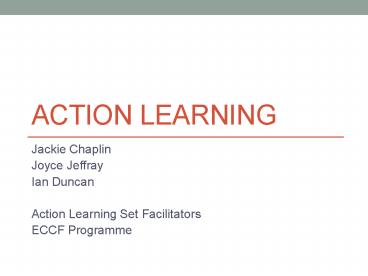Action Learning - PowerPoint PPT Presentation
1 / 15
Title:
Action Learning
Description:
ACTION LEARNING Jackie Chaplin Joyce ... to take a wider view of situations and how they might ... and accepting feedback Handling difficult conversations with more ... – PowerPoint PPT presentation
Number of Views:146
Avg rating:3.0/5.0
Title: Action Learning
1
Action Learning
- Jackie Chaplin
- Joyce Jeffray
- Ian Duncan
- Action Learning Set Facilitators
- ECCF Programme
2
Aims
- To explore what action learning is and how it
contributes to the ECCF Programme - To explore the philosophy and the principles that
underpin action learning - To identify the benefits of action learning
3
Action Learning
A continuous process of learning and reflection
that happens with the support of a group of
colleagues, working with real problems, with the
intention of getting things done
(McCormack et al 2004)
4
ECCF Programme
- Action Learning provides ECCF Fellows with the
opportunity to - Identify issues that are relevant to their role
and explore how they might apply their learning
to those issues - Practice specific skills and how they will use
those skills in their own workplace and review
the outcomes of those actions - Learn how to support and challenge colleagues
while maintaining mutually beneficial
relationships - Be challenged to take a wider view of situations
and how they might manage them
5
Action Learning uses reflection and the cycle of
learning
Stage 1 Having an experience
Stage 4 Applying the learning Planning the next
steps
Stage 2 Reflecting on and analysing the
experience
Stage 3 Concluding from the experience
(Kolb 1984)
6
Action learning and adult Learning
- Respect
- Integrity
- Accepting personal responsibility for learning
- Commitment
- Self awareness
- Set and its members
- Action
- Openness
- to challenge and be challenged
- To Support and be supported
- Reflective practice
7
Principles underpinning action learning
- There is no learning without action and no sober
and deliberate action without learning - Adults learn best when they are directly involved
in their own learning about a current life
situation - Adults who voluntarily choose a learning
experience usually learn more readily - Applying that learning in the workplace makes it
more personally meaningful and of greater benefit
to the organisation - (Revans, 1998)
8
Five main elements of action learning
- The individual voluntarily joins the group
- The set a group of 4/8 people who meet
regularly, agree ground rules and ways of working - The issue or task each person brings what they
want to work on a specific issue - The processes presentation of issues,
challenge, support, agree actions, report back - The facilitator helps the group as it works and
learns - (Revans, 1998)
9
The set
- Equal amount of time
- Listen/encourage without interruption
- Empathise
- Ask questions to challenge and support
- Respect other individuals, the issues that they
face and their perspectives
10
Presenter
- Each set member takes it in turns to present an
issue or situation. Discusses it with the group
honestly and openly. - What is happening here?
- What am I contributing to this issue?
- What do I want to achieve?
- What is stopping me?
- Who can help?
11
Enabler
- The enabler helps the presenter with the issue.
The object is to help define or redefine the
problem or issue and his/her relationship in it,
so that he/she can take steps towards solving it.
Uses open questions. - How does that make you feel?
- How do you want things to be?
- What is the most important aspect of this issue
for you just now? - What do you think would happen if ..?
- How would you know that?
- What could you do?
- What other options are there?
- What one thing could you do?
12
Action Learning Set Process
- Presentation of challenge
- what is the issue/ question/
- what are the contributing factors?
- what did I do?
- what did they do?
- what do I want to happen ?
Dialogue with group listening, questioning and
challenging views, perceptions and assumptions.
Make meaning of experience, draw conclusions ,
commit to integrating learning into everyday
practice
Reflection and creation of thoughts of new
ideas, new understanding, new perspectives,
commitment to action
Bring what happened back to the group. What
went well / not so well / why?
Doing the action Being the change
13
Learning happens at three levels
About the issue being tackled
About oneself
About the process of learning itself
14
Benefits of action learning
- For the participants
- Increased self awareness
- Increased confidence
- Ability to approach situations from a broader and
more varied perspective than in the past - More proactive than reactive in problem solving
and decision making - Better at listening
- Better at giving and accepting feedback
- Handling difficult conversations with more
sensitivity and confidence
15
In summary
- Action learning facilitates the application of
learning within the ECCF programme with benefits
for - Individuals
- Collaborative working
- The care of patients and their families
- Action Learning is about learning by, from and
through action so the rest of this afternoon we
are going to learn about action learning . by
doing































